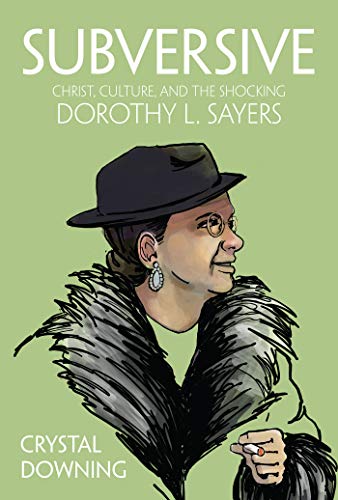At the Chesterton Conference in Chicago, I heard Crystal Downing speak about Dorothy L. Sayers being influenced by G.K. Chesterton. Sayers credited Chesterton for saving her from logical positivism and the path she might have chosen instead.
“When Chesterton died in 1936, Sayers wrote his widow that ”G. K.’s books have become more a part of my mental make-up than those of any writer you could name.“ And she makes clear that it wasn’t simply Orthodoxy that kept her from giving up on orthodoxy, explaining the importance of Chesterton’s novel The Napoleon of Notting Hill, which she read ”at a very impressionable age.”
I was introduced to Dorothy Sayers books as a teenager via Masterpiece Theater when they did the Lord Peter Whimsey novel “The Nine Tailors.” I knew nothing about her other than I liked these novels. Much later, I started to learn more about her. Mainly in connection with all the authors of that era, I was coming to love. So I decided to pick up Crystal Downing’s book on Sayers called “Subversive.” This book concentrates on her dealing with culture when writing on Christ. The plays she wrote for the BBC on Christianity were not something she sought out, but they affected her with the research involved and how to portray the stories.
“When someone asked her opinion about the evangelistic possibilities of religious drama, she replied by emphasizing the need to place artistic quality first and foremost: ”Piety and a spirit of prayer will not turn a bad play into a good one.“ No matter how sincere the intention that generated it or how orthodox the theology within it, ”bad art is a thing damned in itself and damning in its effects.“
There are several reasons Sayers felt so passionately about this issue. First of all, evangelism through the arts can reek too much of an economy of exchange, turning creation into a utilitarian enterprise. As far as she was concerned, writing to generate converts, though noble in sentiment, is not that different in practice from writing to get wealth or fame in exchange. As she told one popular Christian writer, ”You must not accept money, you must not accept applause, you must not accept a ‘following,’ you must not accept even the assurance that you’re doing good as an excuse for writing anything but the thing you want to say.
She also resisted the call from her friend C.S. Lewis to write a series of books “on Christian knowledge” that might edify “young people” still in school.
I enjoyed this book and the concerns that Sayers had when addressing the secular culture and her concerns regarding fellow Christians, and the tendency to make the faith a safe thing that did not have to be thought through. Reading this, I also thought how her approach to presenting these plays reminded me of Flannery O’Connor.
I especially found delightful that during here adolescent period when she felt totally non-religious how the creativity of Chesterton broke through. When her parents tried to persuade her from Chesterton’s quirky novels towards his works like Orthodoxy, Sayers responded with:
“I am not surprised to hear that Chesterton is a Christian. I expect, though, that he is a very cheerful one, and rather original in his views, eh?”
“Subversive”
I recommend this book highly as there is a lot to think over and the concerns Sayers had are even more prevalent.
My only quibble is that when Crystal Downing brings up Reformation-era controversies, they are not fleshed out very well and tend towards typical misunderstandings and oversimplifications.


1 comment
Thanks for the rec – found it at my library and am diving in…. I love Sayers’ writing, and would like to know her thoughts on things more.